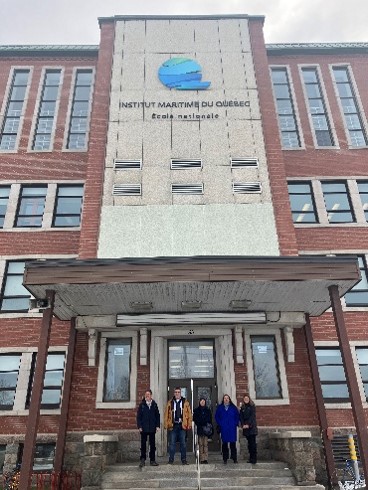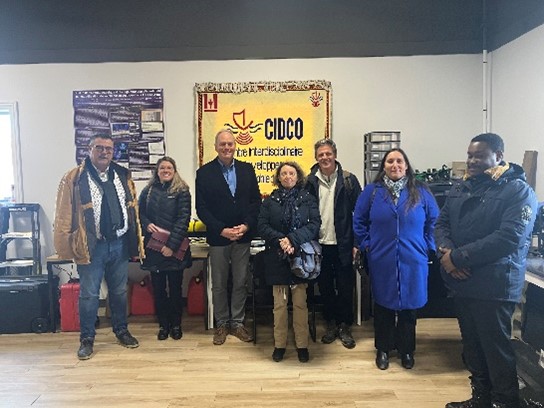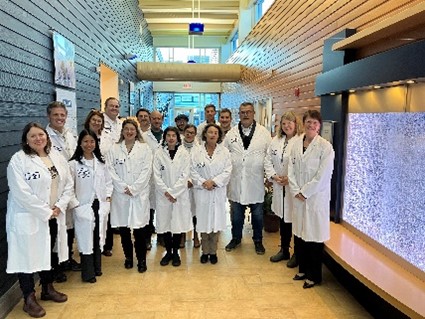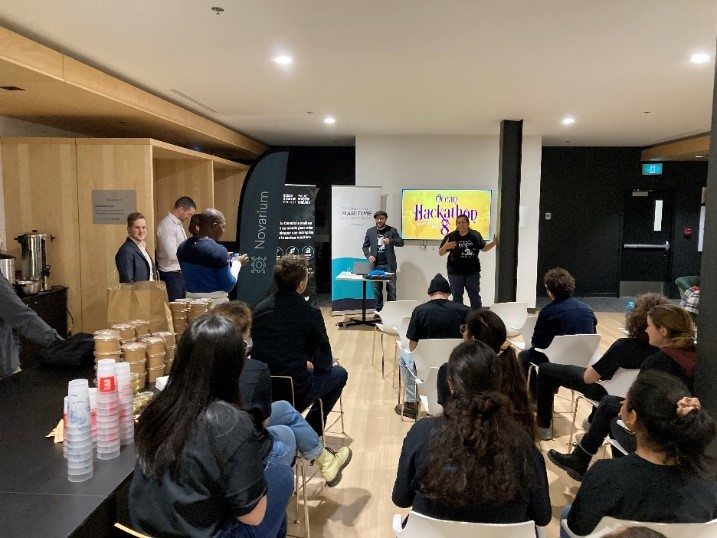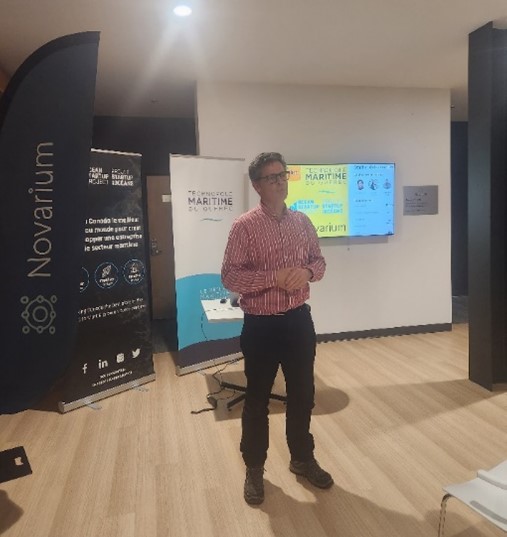Rimouski, a marine science and innovation ecosystem that encourages partnerships
- A delegation from Brest travelled to Rimouski (Canada) from 12 to 19 November to take part in Futurocéan, Quebec's blue economy forum. The mission was organised by Brest as part of its cooperation with Technopole maritime du Québec (TMQ) in Rimouski. Hytech-imaging and Place des Algues benefited from this soft-landing operation.
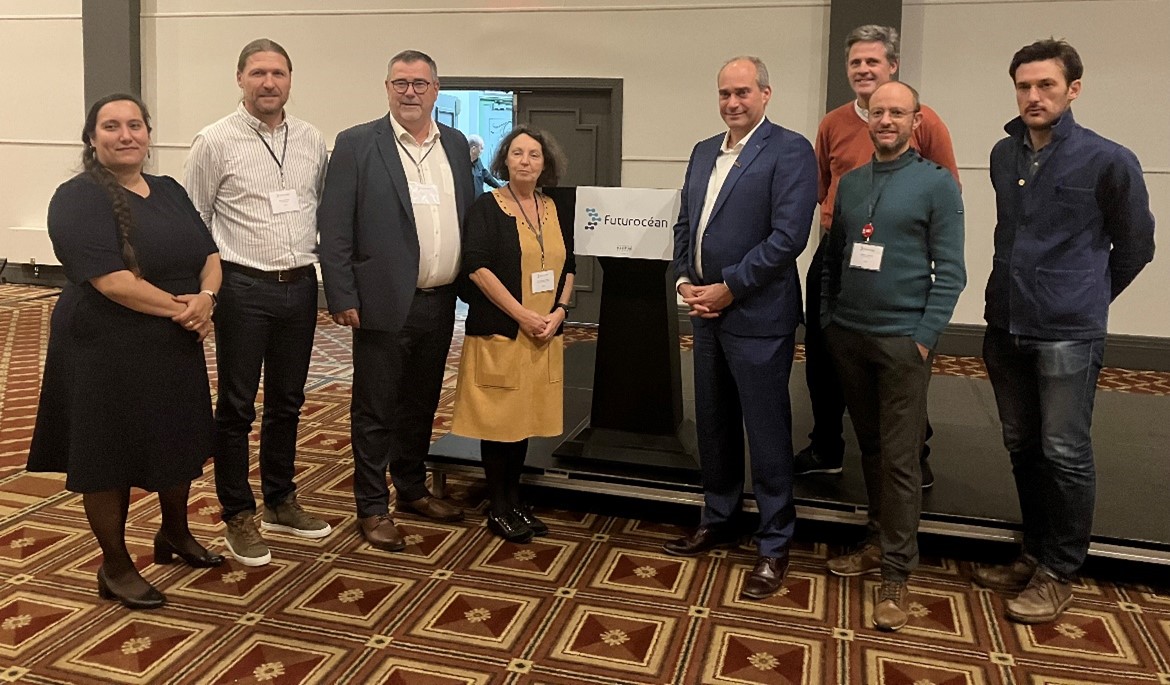
he entire Brest delegation with the Mayor of Rimouski and the Director of TMQ © Brest métropole Hytech-imaging and Place des Algues, economic immersion in the Quebec ecosystem
For Marc Lennon, president and co-founder of Hytech-imaging, this is the second mission to Rimouski in this soft-landing format. In 2022, the company identified the local players, potential partners and possible customers. "This 2nd mission has enabled us to build on the momentum we created last year", explains Marc. The first is with the CIDCO, working on hydrography and coastal bathymetry. "CIDCO has close links with the Canadian Hydrographic Service, which could be a major customer for us." A second partnership is under discussion with MERINOV on the mapping of seaweed resources. "Discussions are progressing well and we aim to rapidly offer projects and services in this field, where the needs are immense across Canada."
For Jean-Baptiste Wallaert, president of Place des algues, this mission was an opportunity to discover the local ecosystem of marine sciences and innovation. It's an area rich in players and quite similar to that of the tip of Brittany. "There are so many organisations (CRBM, UQAR-ISMER, Novarium, etc.) and yet the fact that they are all interconnected makes this ecosystem a small world", says Jean-Baptiste. Some of the subjects of interest identified during the mission were: the development of the algal sector (horticulture, food, extraction of molecules of interest for cosmetology, etc.), acoustics and its use in the preservation of marine mammals, and maritime spatial planning, particularly in interaction with indigenous populations. For Jean-Baptiste, certain values are shared: "we know the limits of wild seaweed harvesting"; "we know the issues linked to the consequences of climate change on marine biodiversity and fishing. This awareness is made by those who live by the sea, who are at the forefront of these changes".
Composition of the Brest delegation:
- Dominique CAP, Vice-President, International Relations and Decentralised Cooperation, Brest Métropole
- Matthieu CHAVE, International Relations Officer, Brest Métropole
- Béatrice THOMAS-TUAL, Vice-President Europe and International, Université de Bretagne Occidentale (UBO)
- Romain LE MOAL, Coordinator of the France-Quebec Institute in support of the maritime sector, Université de Bretagne Occidentale (UBO)
- Jean-Baptiste WALLAERT, President, Place des algues
- Marc LENNON, Chairman and co-founder, Hytech-imaging
A brief overview of Rimouski's ecosystem
Some of the organisations visited:
- Innovation Maritime (IMAR),
- the Interdisciplinary Development Centre for Ocean Mapping (CIDCO),
- the Marine Biotechnology Research Centre (MBRC)
- and the Novarium Campus.
Maritime issues were addressed from a number of angles:
- those of start-ups in the blue economy
- those of First Nations communities
- or the North-South perspective of Velayoudom Marimoutou, Secretary General of the Indian Ocean Commission.
A number of high-potential themes for the Rimouski area:
- AI
- maritime transport and its hydrographic needs
- the potential of algae
- financing the blue economy
- energy transition
- river and marine pollution
- fisheries and aquaculture in the face of global change
- etc.
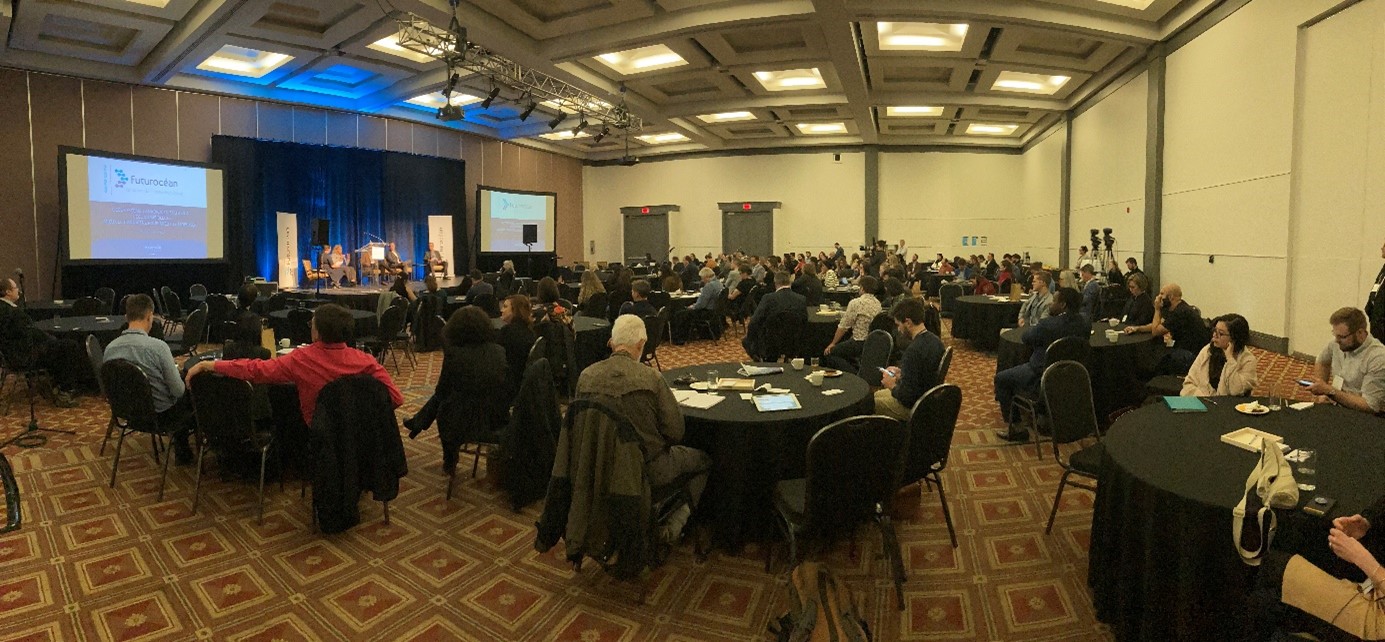
Futurocean forum © Jean-Baptiste Wallaert Brest and Rimouski: a solid partnership
The collaboration between the two territories dates back to 2011. That's 12 years with the support of the Franco-Quebec Fund for Decentralised Cooperation. Launched last spring, the InnoMar project is one of the ways in which the partnership is being strengthened. Its objectives are
- Immerse entrepreneurs in the blue economy ecosystems of both territories
- Bringing delegations to events dedicated to the blue economy on both sides of the Atlantic. Like Hytechimaging and Place des Algues in Rimouski, Quebec companies will be coming to Brest in the coming months.
- Participation in the "Understanding the environmental challenges of the maritime economy" training course organised by the UBO and the Technopôle Brest-Iroise (Campus mondial de la mer).
The Ocean Hackathon® nod
The Friday of the mission to Rimouski was also the start of the local editions of the 8th Ocean Hackathon®, coordinated internationally by the Campus mondial de la mer. Jean-Baptiste Wallaert was invited to take the floor at the opening of the Rimouski edition. "In Rimouski, the culture is one of open data, so that new innovations can be born from the data that is made available."
p>

- Published on 11/30/2023
